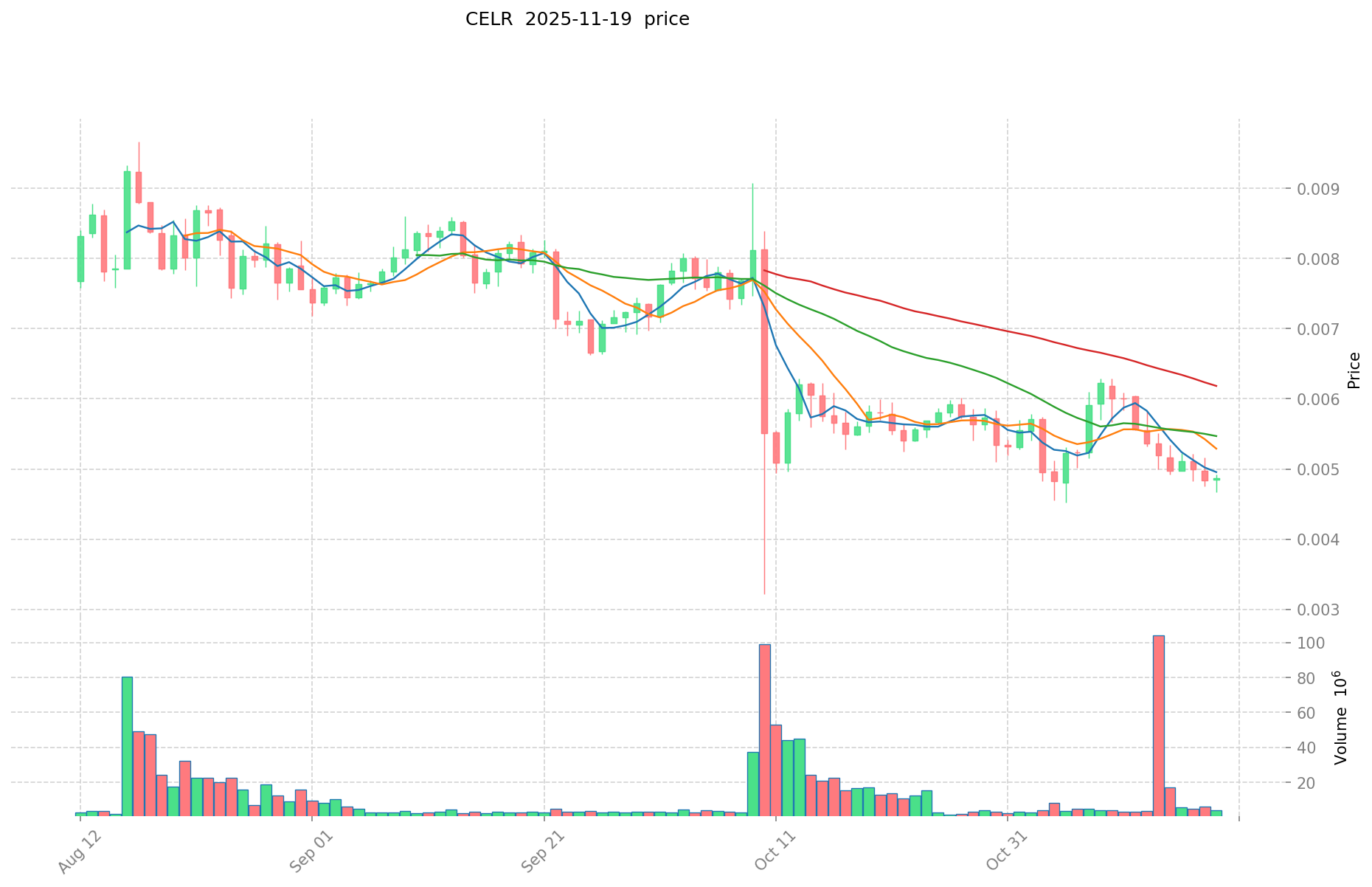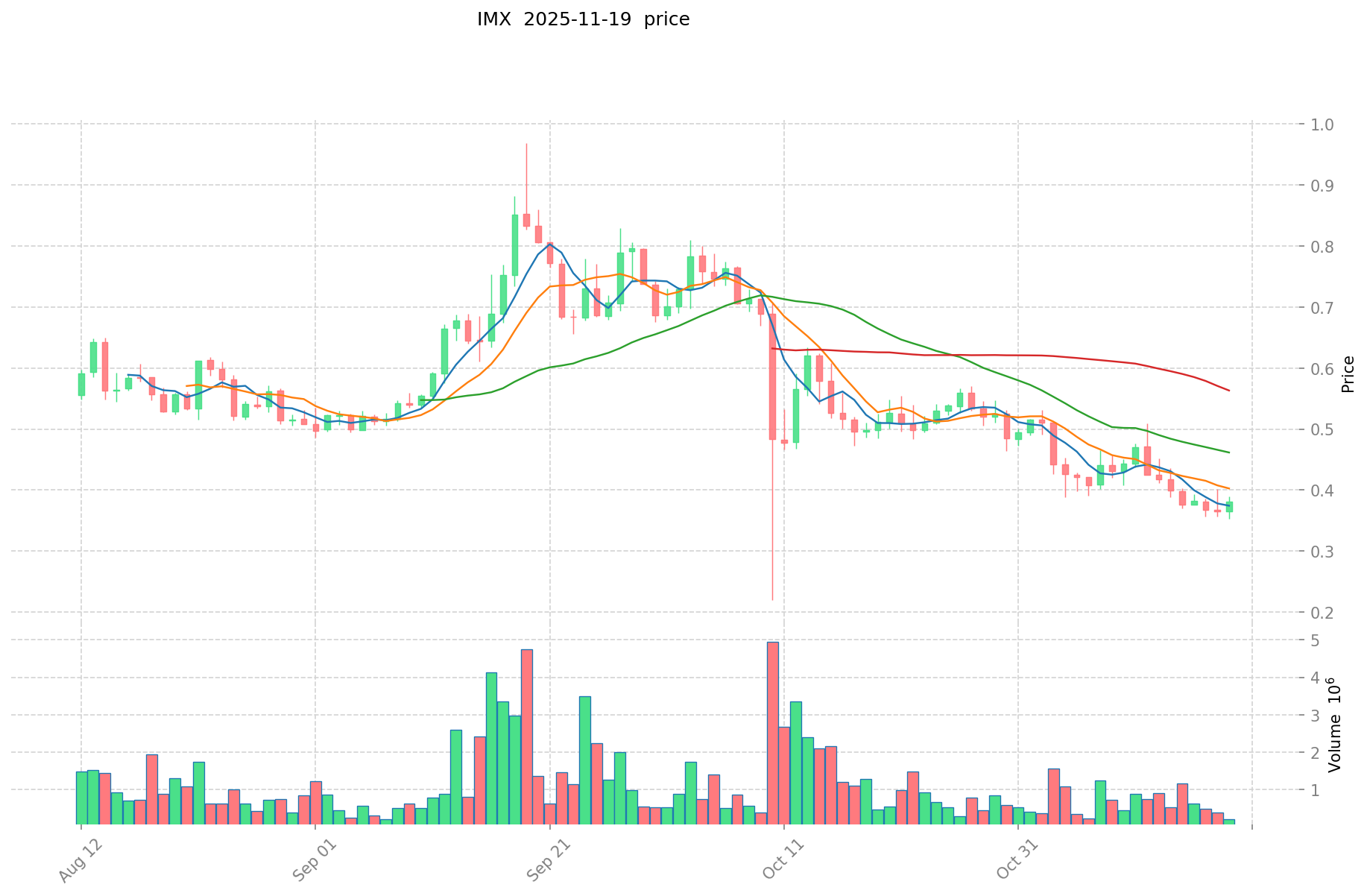CELR vs IMX: Comparing Two Emerging Blockchain Platforms for Gaming and NFTs
Introduction: CELR vs IMX Investment Comparison
In the cryptocurrency market, the comparison between CELR and IMX has always been an unavoidable topic for investors. The two not only show significant differences in market cap ranking, application scenarios, and price performance, but also represent different cryptocurrency asset positioning.
Celer (CELR): Since its launch, it has gained market recognition for its high-performance Layer 2 scalability platform.
Immutable (IMX): Since its inception, it has been hailed as an Ethereum Layer 2 scaling solution for NFTs, becoming one of the cryptocurrencies with high global trading volume and market capitalization.
This article will comprehensively analyze the investment value comparison between CELR and IMX, focusing on historical price trends, supply mechanisms, institutional adoption, technological ecosystems, and future predictions, and attempt to answer the question that investors care about most:
"Which is the better buy right now?"
I. Price History Comparison and Current Market Status
CELR and IMX Historical Price Trends
- 2021: CELR reached its all-time high of $0.194843 on September 26, 2021.
- 2021: IMX reached its all-time high of $9.52 on November 26, 2021.
- Comparative analysis: Since their respective all-time highs, CELR has dropped from $0.194843 to $0.004629, while IMX has fallen from $9.52 to $0.3705.
Current Market Situation (2025-11-19)
- CELR current price: $0.004629
- IMX current price: $0.3705
- 24-hour trading volume: $17,433.24 (CELR) vs $91,740.45 (IMX)
- Market Sentiment Index (Fear & Greed Index): 15 (Extreme Fear)
Click to view real-time prices:
- View CELR current price Market Price
- View IMX current price Market Price


II. Core Factors Affecting the Investment Value of CELR vs IMX
Supply Mechanism Comparison (Tokenomics)
- CELR: Total supply of 10 billion CELR tokens, with a portion allocated to ecosystem development, team, investors, and foundation reserves.
- IMX: Total supply of 2 billion IMX tokens, with allocations for ecosystem development, token rewards for trading and liquidity, and project development.
- 📌 Historical Pattern: Limited supply tokens like IMX tend to benefit from scarcity value during market uptrends, while utility tokens like CELR may see value appreciation based on network usage and adoption.
Institutional Adoption and Market Applications
- Institutional Holdings: IMX has attracted more institutional interest through partnerships with major gaming and entertainment brands.
- Enterprise Adoption: IMX has established partnerships with GameStop, TikTok, and other major brands for NFT marketplaces, while CELR focuses more on layer-2 scaling solutions for enterprises.
- Regulatory Stance: Both tokens operate in similar regulatory frameworks as utility tokens, though IMX's focus on NFTs may face greater regulatory scrutiny in certain jurisdictions.
Technical Development and Ecosystem Building
- CELR Technical Upgrades: Developing Layer-2 solutions focused on cross-chain interoperability and state channels for DeFi applications.
- IMX Technical Development: Zero-knowledge proof technology for Ethereum scaling, focusing specifically on NFT minting and trading with gas-free transactions.
- Ecosystem Comparison: IMX has stronger presence in gaming and NFT marketplaces with over 100 integrated games and applications, while CELR's ecosystem spans broader DeFi applications and cross-chain bridges.
Macroeconomic Factors and Market Cycles
- Performance in Inflationary Environments: Neither token has significant proven history as inflation hedges compared to Bitcoin or Ethereum.
- Macroeconomic Monetary Policy: Both tokens show sensitivity to broader crypto market trends, which are influenced by Fed policy and risk appetite.
- Geopolitical Factors: IMX's gaming focus potentially offers more resilience in cross-border application, while CELR's interoperability solutions could benefit from increased fragmentation of blockchain ecosystems.
III. 2025-2030 Price Prediction: CELR vs IMX
Short-term Prediction (2025)
- CELR: Conservative $0.00384456 - $0.004632 | Optimistic $0.004632 - $0.00667008
- IMX: Conservative $0.329567 - $0.3703 | Optimistic $0.3703 - $0.466578
Mid-term Prediction (2027)
- CELR may enter a growth phase, with prices expected in the range of $0.004456975248 - $0.009994429344
- IMX may enter a consolidation phase, with prices expected in the range of $0.3600249156 - $0.5200359892
- Key drivers: Institutional capital inflow, ETF developments, ecosystem growth
Long-term Prediction (2030)
- CELR: Base scenario $0.010213834080072 - $0.01286943094089 | Optimistic scenario $0.01286943094089+
- IMX: Base scenario $0.724377630706275 - $1.079322669752349 | Optimistic scenario $1.079322669752349+
Disclaimer: The above predictions are based on historical data and market analysis. Cryptocurrency markets are highly volatile and subject to change. This information should not be considered as financial advice.
CELR:
| 年份 | 预测最高价 | 预测平均价格 | 预测最低价 | 涨跌幅 |
|---|---|---|---|---|
| 2025 | 0.00667008 | 0.004632 | 0.00384456 | 0 |
| 2026 | 0.0078549456 | 0.00565104 | 0.005368488 | 21 |
| 2027 | 0.009994429344 | 0.0067529928 | 0.004456975248 | 45 |
| 2028 | 0.0087923966256 | 0.008373711072 | 0.006280283304 | 80 |
| 2029 | 0.011844614311344 | 0.0085830538488 | 0.006351459848112 | 84 |
| 2030 | 0.01286943094089 | 0.010213834080072 | 0.00714968385605 | 119 |
IMX:
| 年份 | 预测最高价 | 预测平均价格 | 预测最低价 | 涨跌幅 |
|---|---|---|---|---|
| 2025 | 0.466578 | 0.3703 | 0.329567 | 0 |
| 2026 | 0.58163021 | 0.418439 | 0.22595706 | 12 |
| 2027 | 0.5200359892 | 0.500034605 | 0.3600249156 | 34 |
| 2028 | 0.749751886737 | 0.5100352971 | 0.30602117826 | 37 |
| 2029 | 0.81886166949405 | 0.6298935919185 | 0.573203168645835 | 70 |
| 2030 | 1.079322669752349 | 0.724377630706275 | 0.630208538714459 | 95 |
IV. Investment Strategy Comparison: CELR vs IMX
Long-term vs Short-term Investment Strategies
- CELR: Suitable for investors focused on Layer 2 scaling solutions and cross-chain interoperability
- IMX: Suitable for investors interested in NFT and gaming ecosystems
Risk Management and Asset Allocation
- Conservative investors: CELR: 30% vs IMX: 70%
- Aggressive investors: CELR: 60% vs IMX: 40%
- Hedging tools: Stablecoin allocation, options, cross-currency portfolios
V. Potential Risk Comparison
Market Risks
- CELR: Higher volatility due to lower market cap and trading volume
- IMX: Exposure to NFT market fluctuations and gaming industry trends
Technical Risks
- CELR: Scalability, network stability
- IMX: Ethereum dependency, potential zero-knowledge proof vulnerabilities
Regulatory Risks
- Global regulatory policies may have different impacts on both tokens, with IMX potentially facing more scrutiny due to its focus on NFTs
VI. Conclusion: Which Is the Better Buy?
📌 Investment Value Summary:
- CELR advantages: Focus on Layer 2 scaling and cross-chain solutions, potential for broader DeFi applications
- IMX advantages: Strong presence in NFT and gaming markets, partnerships with major brands, zero-knowledge proof technology
✅ Investment Advice:
- New investors: Consider a balanced approach with a slight bias towards IMX due to its more established ecosystem
- Experienced investors: Explore a diversified portfolio including both tokens, with allocation based on risk tolerance and market outlook
- Institutional investors: Evaluate both tokens based on specific use cases and potential integration with existing systems
⚠️ Risk Warning: The cryptocurrency market is highly volatile. This article does not constitute investment advice. None
VII. FAQ
Q1: What are the main differences between CELR and IMX? A: CELR focuses on Layer 2 scalability and cross-chain interoperability, while IMX specializes in NFT and gaming ecosystems on Ethereum. CELR has a total supply of 10 billion tokens, while IMX has 2 billion tokens.
Q2: Which token has performed better historically? A: IMX reached a higher all-time high of $9.52 in November 2021, compared to CELR's all-time high of $0.194843 in September 2021. However, both have experienced significant drops since their peaks.
Q3: How do the current market situations of CELR and IMX compare? A: As of 2025-11-19, IMX has a higher price ($0.3705) and 24-hour trading volume ($91,740.45) compared to CELR's price ($0.004629) and trading volume ($17,433.24).
Q4: What are the key factors affecting the investment value of CELR and IMX? A: Key factors include supply mechanisms, institutional adoption, technical development, ecosystem building, and macroeconomic factors such as inflation and monetary policy.
Q5: How do the long-term price predictions for CELR and IMX compare? A: By 2030, CELR's base scenario predicts a range of $0.010213834080072 - $0.01286943094089, while IMX's base scenario predicts $0.724377630706275 - $1.079322669752349.
Q6: Which token is considered more suitable for different types of investors? A: CELR may be more suitable for investors focused on Layer 2 scaling solutions and cross-chain interoperability, while IMX may be better for those interested in NFT and gaming ecosystems. Conservative investors might prefer a 30% CELR / 70% IMX allocation, while aggressive investors might opt for 60% CELR / 40% IMX.
Q7: What are the main risks associated with investing in CELR and IMX? A: Both face market risks, with CELR potentially having higher volatility due to lower market cap. Technical risks include scalability issues for CELR and Ethereum dependency for IMX. Regulatory risks may affect both, with IMX potentially facing more scrutiny due to its NFT focus.
Share
Content